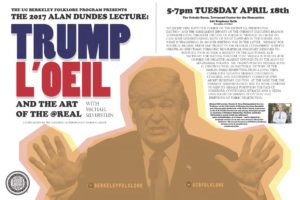UC Berkeley Folklore Program’s 2017 Alan Dundes Lecture
Tuesday April 18, 5 – 7 pm
Geballe Room, Townsend Center for the Humanities, 220 Stephens Hall, UC Berkeley

We might view both the course of the recent US presidential election and the subsequent efforts of the current Executive Branch administration through the lens of political “message,” in order to gain some understanding both of what happened in the former and what is transpiring, in an ever-shifting way, in the latter. “Message” for political figures, much like “brand” in the franker consumerist markets, creates an essentially folkloric biographical imaginary designed to resonate with as wide a segment of the electorate as is necessary for success, whether that message is positive (for oneself) or negative (against opponents) in the agon of adversarial politics. Mr. Trump’s positive message, long in creation, won an electoral victory at the margin while benefitting from a long-term, cumulative negative message centered in Congress and successfully communicated about Secretary Clinton. At the same time, the current administration has to work overtime to keep its message positive in the face of numerous, continuing setbacks and a media onslaught of derisive attention and eruptions of public disaffection.
MICHAEL SILVERSTEIN, Charles F. Grey Distinguished Service Professor at the University of Chicago, has done linguistic and ethnographic fieldwork with Native North Americans in the US Pacific Northwest and among Aboriginal people in Australia’s Northern Kimberley, Western Australia. His essay “The Fieldwork Encounter and the Colonized Voice of Indigeneity” appears in the current number of Representations, the special issue Language-In-Use and the Literary Artifact. Silverstein’s other recent work has addressed mass-mediatization, as it shapes – and is shaped by – language and its use in our own society’s discursive universe. His recent Creatures of Politics (Indiana) focuses on US presidential communication.
 Three distinguished UC Berkeley scholars—Ian Duncan, Representations editorial board member and Florence Green Bixby Chair in the English Department, Mark Bevir, Professor of Political Science and Director of the Center for British Studies, and Akasemi Newsome, Associate Director of the Institute of European Studies—will discuss important questions about Brexit, when the United Kingdom is scheduled to leave the European Union. What’s next for Brexit? Will a deal be reached, and if not, what are the implications of another delay? How will Brexit transform political and economic life in the United Kingdom, Europe, and the world?
Three distinguished UC Berkeley scholars—Ian Duncan, Representations editorial board member and Florence Green Bixby Chair in the English Department, Mark Bevir, Professor of Political Science and Director of the Center for British Studies, and Akasemi Newsome, Associate Director of the Institute of European Studies—will discuss important questions about Brexit, when the United Kingdom is scheduled to leave the European Union. What’s next for Brexit? Will a deal be reached, and if not, what are the implications of another delay? How will Brexit transform political and economic life in the United Kingdom, Europe, and the world?
